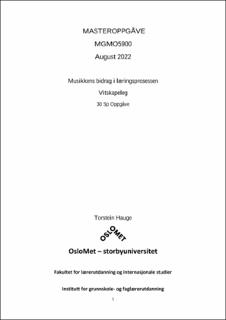| dc.description.abstract | Denne masteroppgåva tar føre seg problemstillinga: Kva er ungdomselevar si oppleving av musikkens påverknad på fokus og konsentrasjon, i ein individuell elevaktivitet? I tillegg skal eg undersøke om det er ein samanheng mellom elevane sin relasjon til musikk og kva grad av påverknad musikk har på fokus og konsentrasjon? For å svare på desse spørsmåla har eg nytta ein triangulerande forskingsmetode, ved hjelp av spørjeskjemaa. Totalt var det 40 informantar, frå 10.trinn, som deltok i forskinga. Den innsamla dataa er analysert og tolka ut frå relevansen informasjonen har i omsyn til problemstillinga og forskingsspørsmåla. I to ulike økter skal elevane høyre på sjølvvald musikk og fellesmusikk, mens dei jobbar individuelt. I dei siste 15 minutta av begge øktene skal elevane som har gitt samtykke, fylle ut totalt to spørjeskjemaa. Innleiingsvis vil eg presentere tidlegare forsking rundt det å bruke musikk i klasserommet og litt om musikkens påverknad generelt på mennesket. Vidare blir relevant teori presentert, som skal hjelpe å diskutere rundt problemstillinga og datamaterialet. I metodekapittelet vil eg kaste lys på kva metode studia nyttar seg av, validiteten, reliabiliteten og spørjeskjemaa. Dermed blir datamateriale presentert og i diskusjonskapittelet blir teorien og dataa saman drøfta for å gi eit svar på problemstillinga. Studia visar at musikk kan for enkelte elevar, ha eit stort potensiale for å støtte elevane i læringsprosessen.
This master thesis explores the issue of what are 10th grade student’s experiences of music’s effect on their focus and concentration, in an individual student activity? In addition I will study is there some relation between the student’s relationship with music and their perceived effect music has on their focus and concentration? To explore these questions I have used a science method called triangulation. This is a combination between a qualitative and quantitative study. The study uses a survey to collect the data material. In total there are 40 participants from 10th grade in this study. The collected data is analyzed and perceived on the back of its relevance to the study. The students who agreed to participate will in the first lesson, listen to self chosen music. In the next lesson they will listen to the same music as a group. In both of these lessons the students will work individually. In the last 15 minutes of each lesson, the informants will be given a survey. In the start of this thesis I will present the motivation and evolution of this study and its issue. Moving on I’ll present some earlier science articles, which explores the use of music in the classroom and some about music’s effect on students in general. The next chapter explores the relevant theory I will use to help me discuss the issue. In the method-chapter I will present in more concrete manner, the science method, the validity, reliability and the surveys. Then the relevant data material will be introduced. The discussion chapter uses the theory and data materials to argue around the issue. The last chapter concludes the study. The study shows signs that music can, for some students, help support them in the working environment in the classroom. | en_US |
